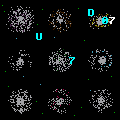




NUL terminated String Comparison and Search
| - Apps & Utilities - Q&A - Info - Libs & Functions - Other Resources - Related Subjects - | |
| Personalized Selections | |
Use our system: Bring Rapid Knowledge Transfer and Awareness to your company website! |





|
! Aware >
Perl >
Text Strings > NUL terminated String Comparison and Search >
NUL terminated String Comparison and Search
|
||||||||
|
Home Subjects By activity User Interface Text Strings Math Processing
Stored Data
Communications
Hard World File System
|
| Related Subjects (Perl) |
Directories and Catalogging - Library and CD catalogs, phone books, bibliographies, et al
Up to NUL Terminated String processing - NUL terminated string operations (strcpy, strlen, etc)
Up to Text Strings - Gateway topic to character and string processing routines. NUL Terminated String processing String conversions,et al. ascii to long, long to �
(Perl delta 5.003 to 5.004) m//gc does not reset search position on failure
(Perl delta 5.003 to 5.004) m//x ignores whitespace before ?*+{} � � No qualified books.
How can I hope to use regular expressions without creating illegible and unmaintainable code?
I'm having trouble matching over more than one line. What's wrong?
How can I pull out lines between two patterns that are themselves on different lines?
I put a regular expression into $/ but it didn't work. What's wrong?
How do I substitute case insensitively on the LHS, but preserving case on the RHS?
How do I use a regular expression to strip C style comments from a file?
What does it mean that regexps are greedy? How can I get around it?
How do I efficiently match many regular expressions at once?
SPINdex Site Searching Suite - Perl-based site searching suite. Currently a live (real-time) search engine, with plans on adding enterprise-level indexing and database searching very soon. {(L)GPL}
grepmail Searches a normal or gzipped mailbox for a given regularexpression {GPL}
(PERL predefined variable) $ARG The default input and pattern-searching space.
(PERL predefined variable) $<digit> Contains the subpattern from the corresponding set of parentheses in the last pattern matched.
(PERL predefined variable) $MATCH The string matched by the last successful pattern match.
(PERL predefined variable) $PREMATCH The string preceding whatever was matched by the last successful pattern match.
(PERL predefined variable) $POSTMATCH The string following whatever was matched by the last successful pattern match.
(PERL predefined variable) $LAST_PAREN_MATCH The last bracket matched by the last search pattern.
(PERL predefined variable) $MULTILINE_MATCHING Set to 1 to do multi-line matching within a string, 0 to tell Perl that it can assume that strings contain a single line, for the purpose of optimizing pattern matches. Default is 0. Use of ``$*'' is deprecated in modern perls.
(Perl builtin function) grep BLOCK LIST This is similar in spirit to, but not the same as, grep(1) and its relatives.
(Perl builtin function) index STR,SUBSTR,POSITION Returns the position of the first occurrence of SUBSTR in STR at or after POSITION.
(Perl builtin function) m// The match operator. See the perlop manpage.
(Perl builtin function) pos SCALAR Returns the offset of where the last m//g search left off
(Perl builtin function) rindex STR,SUBSTR,POSITION returns the position of the LAST occurrence of SUBSTR in STR.
(Perl builtin function) study SCALAR Takes extra time to study SCALAR ($_ if unspecified) in anticipation of doing many pattern matches on the string before it is next modified.
Sort::PolySort - Tokenizes and sorts a list of strings. You can specify how each string should be tokenized, and what the comparison function should be. [Perl] {oss}
Sort::Versions - Sorts version numbers, which isn't as easy as it sounds. Consider 1.1a [Perl] {oss}
String::Approx - Approximate ("fuzzy") matching for strings. You give it a string, it returns a list of all strings that are n insertions, deletions, or substitutions distant from your string. Fuzzy substitutions are also possible. [Perl] {oss}
Search::Text - A common search interface to a number of different text-based search engines. [Perl] {oss}
| Detailed Filter and Focus Checklist |